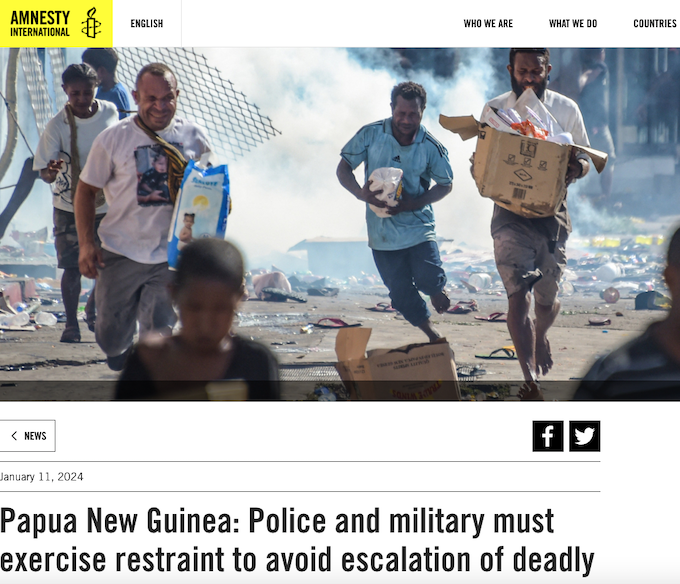Amnesty International is calling on Papua New Guinea authorities to protect human rights in response to the riots.
Port Moresby is in a state of emergency for 14 days with at least 16 people confirmed dead following violent unrest on Wednesday.
The violence broke out with shops and businesses being set alight after public servants went on strike over what has been described as a payroll error.
- READ MORE: Aftermath of Port Moresby looting, rioting – 14-day state of emergency
- PNG’s Marape under pressure to resign as 6 MPs quit after Moresby riots
- At least 15 dead in Papua New Guinea rioting and looting – China lodges protest
- At least 10 dead after looting, fires on Port Moresby’s ‘darkest day’
- Violent riots in PNG leave 16 people dead, as PM declares state of emergency for 14 days
- Café Pacific’s report on the rioting as death toll rises
- Looting breaks out in PNG capital during police and military strike
- Contingent of Highlands Mobile Squad expected in Port Moresby
- Kavieng town under siege
Prime Minister James Marape announced at a late night news conference on Thursday that more than 1000 defence force personnel WEre ready to step in whereever necessary.
Amnesty International Pacific researcher Kate Schuetze told RNZ Pacific firearms was often never an appropriate way to respond to protests.
“They have declared a state of emergency under the constitution which gives extraordinary powers to the authorities like the police and the military,” Schuetze said.
“What we really want to do is just remind them that protesters have human rights, that people in the streets have rights as well and ultimately, they have to work in a way to use the least lethal force possible and uphold the right to life.”
Members of the disciplined forces were among those protesting after their fortnightly pay checks were reduced by up to 300 kina (US$80).
Schuetze said the deductions for some officers amounted to half their pay packet.
“The deductions we’re talking about here are not an insignificant amount … understandably they were concerned.
“There’s questions around how much the government knew prior to the strike around this pay area and why they didn’t take steps to address it sooner.”

Schuetze said inflation was a concern for people.
“A lot of people are doing it tough in Papua New Guinea and I think it could be a sign of rising resentment and dissatisfaction with the leadership of the government, as well as livelihood factors that people feel are not being addressed.”
Marape is under increasing political pressure to step down, with six members of his coalition government resigning in the aftermath of the deadly violence.
Among them, Chauve MP James Nomane and Hiri-Koiari MP Kieth Iduhu made their resignations public via social media and blamed blamed Marape for the riots.
Schuetze said there needed to be “prompt, impartial and independent investigation” into what happened, including the causes of the riots.
“Likely there will be several colliding factors which cause this to happen.
“Any government, if this happens on their watch, if it happened in Australia, in New Zealand, we would expect there to be a full independent public inquiry.”
She said there tended to be an absence of appropriate police response to address the violent acts once they had occurred in Papua New Guinea.
“Obviously, the fact that people have died in the course of these riots is a really strong indicator that there may be human rights violations by the state.”
Schuetze said there were lots of videos uploaded to social media that showed police actively encouraging and participating in the chaos.
“If the police themselves were involved in acts of violence, there is a responsibility of the state to hold them accountable as well, as much as any other person engaged in active violence.”
‘Dysfunctional government’
Anti-corruption watchdog Transparency International PNG (TIPNG) said the frustration among police, and other public servants over tax calculations, was just the tip of the iceberg of a dysfunctional government system.
It is calling on the PNG government to engage immediately in genuine open dialogue with the police representatives to address their legitimate grievances.
The organisation’s board chair Peter Aitsi said this must be done quickly through transparent and open communication in order to resolve this crisis.
Aitsi said the public service and police were institutions of the state, and if truly independent and free of political control, should play a critical role as a check and balance to the executive government.
Open for business
Meanwhile, PNG’s largest retail and wholesale organisation — the CPL Group — has re-opened for business.
In a statement on Friday, the company said its Stop & Shop outlet at Waigani Central, Town, Boroko, Airways was now open.
The City Pharmacy chain in Waigani Drive, Boroko and Vision city are also open for trading.
However, the group says those outlets in areas which “suffered devastatingly” remained closed.
It is also warned people not to use stolen pharmaceutical products, including baby formulas, off the counter and prescription medicines.
It is urging the public not to buy these products as they may be damaged and tampered with and wrong doses could be administered.
This article is republished under a community partnership agreement with RNZ.
This post was originally published on Asia Pacific Report.